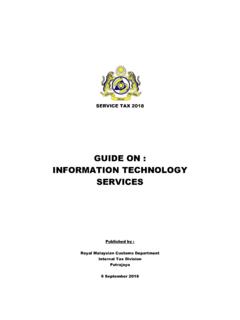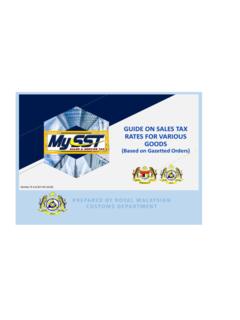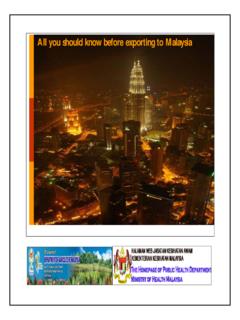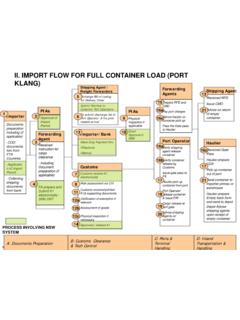Transcription of MS 1500:2019 MALAYSIAN STANDARD - VNC
1 MS 1500:2019 Halal food - General requirements (Third revision)ICS: Descriptors: halal, food, requirements, compliance, certification Copyright 2019 DEPARTMENT OF STANDARDS MALAYSIAMALAYSIAN STANDARD Licensed to VN Advisory Services used only; Date: 06/05/2019; Single user license only; Copying and networking are prohibited. DEVELOPMENT OF MALAYSIAN STANDARDS The Department of Standards Malaysia (Standards Malaysia) is the national standards and accreditation body of Malaysia. The main function of S tandards Malaysia is to foster and promote s tandards, standardisation an d a ccreditation as a means of advancing the national economy, promoting industrial efficiency and development, benefiting the health and safety of the public, protecting the consumers, facilitating domestic and international trade and furthering international cooperation in relation to s tandards and standardisation. MALAYSIAN S tandards (MS) are developed through consensus by committees which comprise balanced representation of producers, users, consumers and others with relevant interests, as may be appropriate to the subject at hand.
2 To the greatest extent possibl e, MALAYSIAN Standards are aligned to or are adoption of i nternational s tandards. Approval of a STANDARD as a MALAYSIAN S tandard is governed by the Standards of Malaysia Act 1996 [Act 549]. MALAYSIAN Standards are reviewed periodica lly. The use of MALAYSIAN Standards is voluntary except in so far as they are made mandatory by regulatory authorities by means of regulations, local by- laws or any other similar ways. For further information on MALAYSIAN Standards, please contact: Department of Standards Malaysia Level 1 & 2, Block 2300, Century Square Jalan Usahawan 63000 Cyberjaya Selangor Darul Ehsan MALAYSIA Tel: 60 3 8318 0002 Fax: 60 3 8319 3131 Email: Licensed to VN Advisory Services used only; Date: 06/05/2019; Single user license only; Copying and networking are prohibited. MS 1500:2019 STANDARDS MALAYSIA 2019 - All rights reserved i Contents Page Committee ii iv v 1 1 2 Normative 1 3 Terms and 1 4 4 Management 4 Premises and 5 Devices, utensils, machines, processing aids and 5 Hygiene, sanitation and food safety.
3 6 Processing of halal food .. 7 Storage, transportation, display, sale and servings of halal food .. 9 Packaging and labelling .. 9 Legal requirements .. 10 5 10 6 Halal 10 7 Halal certification 10 Annex A Method of sertu according to Shariah law for najs 11 12 Licensed to VN Advisory Services used only; Date: 06/05/2019; Single user license only; Copying and networking are prohibited. MS 1500:2019 STANDARDS MALAYSIA 2019 - All rights reserved ii Committee representation The Industry Standards Committee on Halal Standards (I SC I) under whose authority this MALAYSIAN STANDARD was developed, comprises representatives from the following organisations: Department of Islamic Development Malaysia Department of Standards Malaysia (Secretariat) Department of Veterinary Services Federal Agricultural Marketing Authority Federation of MALAYSIAN Manufacturers Halal Industry Development Corporation Sdn Bhd Institute of Islamic Understanding Malaysia Institute of Quality Malaysia International Islamic University Malaysia MALAYSIAN Agricultural Research and Development Institute MALAYSIAN Association of Standards Users Ministry of Domestic Trade and Consumer Affairs Ministry of Health Malaysia (Food Safety dan Quality Division) Ministry of Health Malaysia (Medical Device Authority) Ministry of Health Malaysia (National Pharmaceutical Regulatory Division)
4 Ministry of International Trade and Industry Muslim Consumers Association of Malaysia Royal Customs Department Universiti Sains Islam Malaysia The Technical Committee on Halal Food and Islamic Consumer Goods which developed this MALAYSIAN STANDARD consists of representatives from the following organisations: Department of Agriculture Malaysia Department of Fisheries Malaysia Department of Islamic Development Malaysia Department of Islamic Development Malaysia (Halal Hub Division) Department of Standards Malaysia (Secretariat) Department of Veterinary Services Federal Agricultural Marketing Authority Federal Territory Mufti Office Federation of MALAYSIAN Manufacturers Halal Industry Development Corporation Sdn Bhd Institute of Islamic Understanding Malaysia MALAYSIAN Agricultural Research and Development Institute MALAYSIAN Association of Standards Users Ministry of Domestic Trade and Consumer Affairs Ministry of Health Malaysia (Food Safety and Quality Division)
5 Ministry of International Trade and Industry Muslim Consumers Association of Malaysia Royal Customs of Malaysia SIRIM Research and Technology Innovations Sdn Bhd Universiti Kebangsaan Malaysia Universiti Putra Malaysia Universiti Teknologi MARA Universiti Sains Islam Malaysia Licensed to VN Advisory Services used only; Date: 06/05/2019; Single user license only; Copying and networking are prohibited. MS 1500:2019 STANDARDS MALAYSIA 2019 - All rights reserved iii Committee representation (Continued) The Working Group on Halal Food which developed this MALAYSIAN STANDARD consists of representatives from the following organisations: Department of Islamic Development Malaysia Department of Standards Malaysia Department of Agriculture Malaysia Department of Islamic Development Malaysia Department of Veterinary Services (Diagnostic and Quality Assurance Division) Department of Veterinary Services (Downstream Industry Development Division) Federal Territory Mufti Office Federation of MALAYSIAN Manufacturers Federation of Agricultural Marketing Authority Halal Industry Development Corporation Institute of Islamic Understanding Malaysia Islamic Science University of Malaysia MALAYSIAN Agricultural Research and Development Institute MALAYSIAN Association of Hotels Malaysia External Trade Development Corporation Ministry of Health (Food Safety and Quality Division) Muslim Consumers Association of Malaysia Universiti Kebangsaan Malaysia Universiti Putra Malaysia (Halal Product Research Institute) Ministry of Housing and Local Government (Co-opted)
6 Universiti Putra Malaysia (Animal production, Institute for Tropical Agriculture) (Co-opted) Licensed to VN Advisory Services used only; Date: 06/05/2019; Single user license only; Copying and networking are prohibited. MS 1500:2019 STANDARDS MALAYSIA 2019 - All rights reserved iv Foreword This MALAYSIAN STANDARD was developed by the Working Group on Halal Food under the authority of the National Standards Committee on Halal Standards. Major modifications in this revision are as follows: a) the title of has been changed to Halal food - General requirements; b) incorporation of clause on Normative reference ; c) incorporation of definition on food , halal competent authority , non-halal , fatwa and sertu ; d) introduction of requirements on halal integrity, record management, religious practise and staff participation in the Management responsibility ; e) introduction of Muslim facilities in Premises and facilities ; f) deletion of clause on Slaughtering process and its annex; and g) amendment and improvement on various clauses for clarity.
7 This MALAYSIAN STANDARD cancels and replaces MS 1500:2009, Halal food - Production, preparation, handling and storage - General guidelines (Second revision) Compliance with a MALAYSIAN STANDARD does not of itself confer immunity from legal obligations. Licensed to VN Advisory Services used only; Date: 06/05/2019; Single user license only; Copying and networking are prohibited. MS 1500:2019 STANDARDS MALAYSIA 2019 - All rights reserved v Introduction Halalan Toyyiban are two Arabic words mentioned in the four surahs in the Quran. One of the four surahs is surah al-Baqarah: verse 168, O ye people! Eat of what is on earth, Lawful and good and do not follow the footsteps of the evil one, for he is to you an avowed enemy . Halalan toyyiban encompass several elements including halal foods and beverages are obligation halal and both source are obtained from a halal source, accepted by nature or fitrah, not shubhah (their status is not sure), clean, safe and nutritious.
8 Related to these, halal is also covering preparation, processing and storage of consumable and non-consumable which must conform to rules and regulation stipulated under Shariah law and fatwa. The Halalan toyyiban concept is not only used in foods, beverages and daily consuming products such as cosmetics and pharmaceuticals, but is also extend towards trade and financial services, logistic, social and business transaction and investments. The MALAYSIAN Standards relating to halal have been developed to meet the challenges of growing demand for halal products, services and its infrastructure as counterpart of halal ecosystem in Malaysia. Muslim consumer awareness towards halal issue has also significantly contributes to this demand. The MALAYSIAN Standards for Halal series were formulated based on the concept of halal built-in by the relevant stakeholders. Halal built-in is a systematic approach towards halal management and control systems in all aspect which involve the supply chain and logistical aspects including the segregation of consumable and non-consumable products which are dedicated for exclusively halal.
9 The halal built-in system is to ensure the food production is according to Shariah law and fatwa which meets safety, quality and nutritional standards. Thus, the halal products shall not be tested but shall be built-in into the management system. The halal requirements are stated by Shariah law and fatwa, are incorporated into Halal Standards developed by Department of STANDARD Malaysia. Licensed to VN Advisory Services used only; Date: 06/05/2019; Single user license only; Copying and networking are prohibited. MS 1500:2019 STANDARDS MALAYSIA 2019 - All rights reserved 1 Halal food - General requirements (Third revision) 1 Scope This MALAYSIAN STANDARD specifies the general requirements in the manufacturing and handling of halal foods (including nutrient supplements). It serves as a basic requirement for halal food in general. 2 Normative references The following normative references are indispensable for the application of this STANDARD .
10 For dated references, only the edition cited applies. For undated references, the latest edition of the normative references (including any amendments) applies. MS 2393, Islamic and halal principles - Definitions and interpretations on terminology 3 Terms and definitions For the purposes of this STANDARD , the terms and definitions given in MS 2393 and the following definitions apply. competent authority Competent authority is the agency which is entrusted by the government to carry out work according to specified requirements. NOTE. In Malaysia, there are various competent authorities which are responsible in respective areas such as Islamic affairs, halal certification, animal health, public health, food safety, and etc. halal competent authority In Malaysia, the halal competent authorities are Department of Islamic Development Malaysia (JAKIM) and the various State Islamic Religious Councils. food Food includes every article manufactured, sold or represented for use as food or drink for human consumption or which enters into or is used in the composition, preparation, preservation, of any food or drink and includes confectionery, chewing substances and any ingredient of such food, drink, confectionery or chewing substances.






